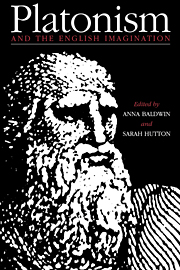Book contents
- Frontmatter
- Contents
- Notes on contributors
- Preface
- I ANTIQUITY
- II THE EARLY CHRISTIAN PERIOD AND THE MIDDLE AGES
- III THE RENAISSANCE AND THE SEVENTEENTH CENTURY
- 7 Introduction
- 8 The transformation of Platonic love in the Italian Renaissance
- 9 Uses of Plato by Erasmus and More
- 10 Italian Neoplatonism and the poetry of Sidney,Shakespeare, Chapman and Donne
- 11 Shakespeare on beauty, truth and transcendence
- 12 Platonism in Spenser's Mutability Cantos
- 13 Reason, Recollection and the Cambridge Platonists
- 14 Platonic ascents and descents in Milton
- 15 Platonism in some Metaphysical poets
- IV THE EIGHTEENTH CENTURY
- V THE NINETEENTH CENTURY
- VI THE TWENTIETH CENTURY
- Bibliography
- Index
12 - Platonism in Spenser's Mutability Cantos
Published online by Cambridge University Press: 15 December 2009
- Frontmatter
- Contents
- Notes on contributors
- Preface
- I ANTIQUITY
- II THE EARLY CHRISTIAN PERIOD AND THE MIDDLE AGES
- III THE RENAISSANCE AND THE SEVENTEENTH CENTURY
- 7 Introduction
- 8 The transformation of Platonic love in the Italian Renaissance
- 9 Uses of Plato by Erasmus and More
- 10 Italian Neoplatonism and the poetry of Sidney,Shakespeare, Chapman and Donne
- 11 Shakespeare on beauty, truth and transcendence
- 12 Platonism in Spenser's Mutability Cantos
- 13 Reason, Recollection and the Cambridge Platonists
- 14 Platonic ascents and descents in Milton
- 15 Platonism in some Metaphysical poets
- IV THE EIGHTEENTH CENTURY
- V THE NINETEENTH CENTURY
- VI THE TWENTIETH CENTURY
- Bibliography
- Index
Summary
Spenser's fascination with Platonism continually manifests itself in his poetry. The ideological and allegorical possibilities of Platonism continually act as a catalyst in Spenser's imagination. Within The Faerie Queene, there are numerous occasions where Spenser employs Platonic doctrines to suit his fictional needs; a salient example of this is in the Garden of Adonis episode (III.vi), where Spenser reflects and refracts Platonic notions of the soul and of generation. Spenser draws on Platonic doctrines and assumptions in other poems as well. Most notably this occurs in the Fowre Hymnes, which trace the interrelationship and integration of Platonic concepts of earthly and ideal love with their Christian counterparts.
Precisely where and from whom Spenser derived his Platonism is difficult to determine. Much of his understanding of Platonism came from writers steeped in the Platonic tradition, such as Macrobius,Boethius (whose Consolation was transmitted to Spenser via Chaucer's Boece), Bernard Silvestris, Alain de Lille (whom Spenser refers to name in the Mutabilitie Cantos), and Dionysius the Areopagite (whose angelic hierarchies are mentioned in Hymne of Heavenly Beautie, II.85–98). As the notes to the Variorum edition of Spenser's works confirm, Spenser was also familiar with the poetic and prose redactions of Platonism of such writers as Castiglione, Tasso, Leone Ebreo, and Giordano Bruno. Given the subject matter and phrasing of the Fowre Hymnes, it is virtually certain that Spenser read Ficino's commentary on Plato's Symposium, the well known De Amore; and may well be that Spenser read Ficino's 1492 translation of the Enneads, thus making Spenser one of the first English authors to read Plotinus directly.
- Type
- Chapter
- Information
- Platonism and the English Imagination , pp. 126 - 138Publisher: Cambridge University PressPrint publication year: 1994
- 4
- Cited by



